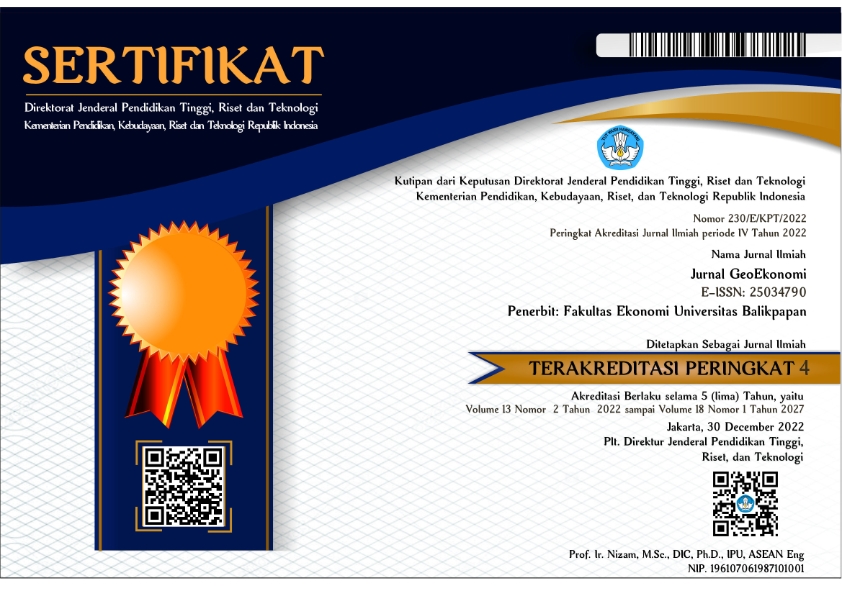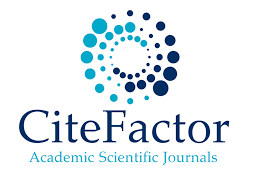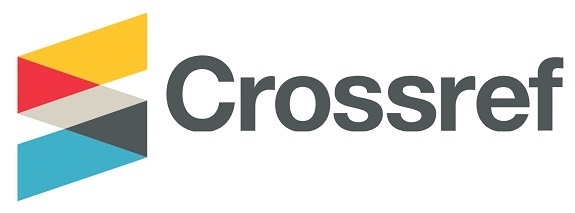PENGARUH BUDAYA PEMBELAJARAN ORGANISASI DAN EFIKASI DIRI TERHADAP KINERJA AKADEMIK MAHASISWA MELALUI MEDIASI MOTIVASI
DOI:
https://doi.org/10.36277/geoekonomi.v15i2.501Keywords:
Organizational Learning Culture, Self-Efficacy, Motivation, Students' Academic PerformanceAbstract
This study investigates the impact of organizational learning culture and self-efficacy on students' academic performance, considering motivation as an important mediator. Using quantitative methods and a survey of students at Airlangga University, data were analyzed using Structural Equation Modeling techniques (SEM-PLS). The findings show that motivation has a significant positive impact on academic performance. Although organizational learning culture does not have a significant direct effect, self-efficacy proves to be a strong factor. Motivation emerges as an important mediator in the relationship between self-efficacy and students' academic performance. Limitations of this study include a sample limited to Airlangga University, which may not represent the entire student population, and a focus on a few factors without considering other potential variables. Based on these findings and limitations, further research with a larger and more diverse sample is recommended. Future studies can explore other factors influencing academic performance, such as learning environment, social support, and psychological elements. A deeper understanding of organizational learning and self-efficacy on academic performance can make a significant contribution to the educational literature.
Downloads
References
Abun, Damianus, Marlene T. Nicolas, Estrella P. Apollo, Theogenia Magallanes, and Mary Joy Encarnacion. 2021. “Research in Business & Social Science Employees ’ Self -Efficacy and Work Performance of Employees as Mediated by Work Environment.” International Journal Of Research In Business And Social Science 10(7):1–15.
Ahmad Afzali, Motahari Amir Arash, and Hatami-Shirkouhi Loghman. 2014. “Investigating the Influence of Perceived Organizational Support, Psychological Empowerment and Organizational Learning on Job Performance: An Empirical Investigation.” Tehnicki Vjesnik-Technical Gazette 3651(55):623–29.
Akhtar, Shafqat Naeem, Muhammad Iqbal, and Ijaz Ahmed Tatlah. 2017. “Relationship between Intrinsic Motivation and Students’ Academic Achievement: A Secondary Level Evidence.” Bulletin of Education and Research 39(2):19–29.
Al-Musadieq, Muhammad, N. Nurjannah, Kusdi Raharjo, Solimun Solimun, and Adji Achmad Rinaldo Fernandes. 2018. “The Mediating Effect of Work Motivation on the Influence of Job Design and Organizational Culture against HR Performance.” Journal of Management Development 37(6):452–69. doi: 10.1108/JMD-07-2017-0239.
Al-Sada, Maryam, Bader Al-Esmael, and Mohd Nishat Faisal. 2017. “Influence of Organizational Culture and Leadership Style on Employee Satisfaction, Commitment and Motivation in the Educational Sector in Qatar.” EuroMed Journal of Business 12(2):163–88. doi: 10.1108/EMJB-02-2016-0003.
Alessandri, Guido, Laura Borgogni, Wilmar B. Schaufeli, Gian Vittorio Caprara, and Chiara Consiglio. 2015. “From Positive Orientation to Job Performance: The Role of Work Engagement and Self-Efficacy Beliefs.” Journal of Happiness Studies 16(3):767–88. doi: 10.1007/s10902-014-9533-4.
Alwagait, Esam, Basit Shahzad, and Sophia Alim. 2015. “Impact of Social Media Usage on Students Academic Performance in Saudi Arabia.” Computers in Human Behavior 51:1092–97. doi: 10.1016/j.chb.2014.09.028.
Anam, Saruful, and Zaim Mukaffi. 2020. “Pengaruh Kepemimpinan Tranformasional Terhadap Kinerja Karyawan Dengan Motivasi Sebagai Variabel Intervening.” Jurnal GeoEkonomi 11:1–6.
Arrywibowo, Imam, and Rahma. 2020. “Pengaruh Disiplin, Motivasi, Dan Kepemimpinan Terhadap Kepuasan Kerja Pegawai Badan Keuangan Kabupaten Penajam Paser Utara.” Jurnal GeoEkonomi 11(2):150–56. doi: 10.36277/geoekonomi.v11i2.125.
Baloch, Saira, Mohsin Shafi, Mohsin Ali Baloch, Ahsan Shafi Memon, and Hina Fatima. 2016. “Critical Success Factors (CSFs) for TQM Implementation: Current Status and Challenges in Libyan Manufacturing Companies.” GSTF Journal on Business Review 4(4):71–79. doi: 10.5176/2010-4804_4.4.393.
Banerjee, Pratyush, Ritu Gupta, and Reid Bates. 2017. “Influence of Organizational Learning Culture on Knowledge Worker’s Motivation to Transfer Training: Testing Moderating Effects of Learning Transfer Climate.” Current Psychology 36(3):606–17. doi: 10.1007/s12144-016-9449-8.
Çetin, Fatih, and Duysal Aşkun. 2018. “The Effect of Occupational Self-Efficacy on Work Performance through Intrinsic Work Motivation.” Management Research Review 41(2):186–201. doi: 10.1108/MRR-03-2017-0062.
Chang, Chiung Sui, Eric Zhi Feng Liu, Hung Yen Sung, Chun Hung Lin, Nian Shing Chen, and Shan Shan Cheng. 2014. “Effects of Online College Student’s Internet Self-Efficacy on Learning Motivation and Performance.” Innovations in Education and Teaching International 51(4):366–77. doi: 10.1080/14703297.2013.771429.
Chen, Ching Fu, and Shu Chuan Chen. 2014. “Measuring the Effects of Safety Management System Practices, Morality Leadership and Self-Efficacy on Pilots’ Safety Behaviors: Safety Motivation as a Mediator.” Safety Science 62:376–85. doi: 10.1016/j.ssci.2013.09.013.
Clark, Melissa. 2017. “Imposed-Inquiry Information-Seeking Self-Efficacy and Performance of College Students: A Review of the Literature.” Journal of Academic Librarianship 43(5):417–22. doi: 10.1016/j.acalib.2017.05.001.
Damanik, Yesni Riana, Prihatin Lumbanraja, and Sukaria Sinulingga. 2020. “The Effect of Talent Management and Self-Efficacy through Motivation toward Performance of Population and Civil Notice of Simalungun District.” International Journal of Research and Review (Ijrrjournal.Com) 7(1):1.
Esmaeilzadeh, Abasali, Parisa Irannezhad, Ramazan Jahanian, and Abolfazl Ghasemzadeh. 2021. “Iranian Journal of Educational Sociology.” Iranian Journal of Educational Sociology 4(1):29–36.
Francis, Bindhia K., and Suvanam Sasidhar Babu. 2019. “Predicting Academic Performance of Students Using a Hybrid Data Mining Approach.” Journal of Medical Systems 43(6):162. doi: 10.1007/s10916-019-1295-4.
Gomes, Giancarlo, and Rafaele Matte Wojahn. 2017. “Organizational Learning Capability, Innovation and Performance: Study in Small and Medium-Sized Enterprises (SMES).” Revista de Administração 52(2):163–75. doi: 10.1016/j.rausp.2016.12.003.
Hair, J. F., G. T. M. Hult, &. Ringle, C. M., and M. Sarstedt. 2017. “A Primer on Partial Least Squares Structural Equation Modeling (PLS-SEM). Thousand Oaks.” Sage.
Hendri, Muhammad Irfani. 2019. “The Mediation Effect of Job Satisfaction and Organizational Commitment on the Organizational Learning Effect of the Employee Performance.” International Journal of Productivity and Performance Management 68(7):1208–34. doi: 10.1108/IJPPM-05-2018-0174.
Herdian, Panji Dwi, Riyadi Nugroho, and Sumiati Sumiati. 2020. “The Effect of Work Motivation and Spiritual Intelligence on Employee Performance With Organizational Citizenship Behaviour (Ocb) As Intervening Variables.” Jmm17 7(01):1–12. doi: 10.30996/jmm17.v7i01.3541.
Honicke, Toni, and Jaclyn Broadbent. 2016. “The Influence of Academic Self-Efficacy on Academic Performance: A Systematic Review.” Educational Research Review 17:63–84. doi: 10.1016/j.edurev.2015.11.002.
Hung, Richard Yu Yuan, Baiyin Yang, Bella Ya Hui Lien, Gary N. McLean, and Yu Ming Kuo. 2010. “Dynamic Capability: Impact of Process Alignment and Organizational Learning Culture on Performance.” Journal of World Business 45(3):285–94. doi: 10.1016/j.jwb.2009.09.003.
Hur, Won Moo, Tae Won Moon, and Jun Ho Lee. 2021. “The Effect of Self-Efficacy on Job Performance through Creativity: The Moderating Roles of Customer Incivility and Service Scripts.” Asia Pacific Journal of Marketing and Logistics 33(3):888–905. doi: 10.1108/APJML-03-2019-0138.
Joo, Baek Kyoo, and Taejo Lim. 2009. “The Effects of Organizational Learning Culture, Perceived Job Complexity, and Proactive Personality on Organizational Commitment and Intrinsic Motivation.” Journal of Leadership and Organizational Studies 16(1):48–60. doi: 10.1177/1548051809334195.
Li, Xiang, Ruihui Pu, and Nutteera Phakdeephirot. 2022. “The Influence of Achievement Motivation on College Students’ Employability: A Chain Mediation Analysis of Self-Efficacy and Academic Performance.” Frontiers in Psychology 13(October):1–14. doi: 10.3389/fpsyg.2022.972910.
Lishinski, Alex, Aman Yadav, Jon Good, and Richard Enbody. 2016. “Learning to Program: Gender Differences and Interactive Effects of Students’ Motivation, Goals, and Self-Efficacy on Performance.” Pp. 211–20 in Proceedings of the 2016 ACM Conference on International Computing Education Research. Vol. 1. New York, NY, USA: ACM.
Lu, Owen, Anna Huang, Jeff Huang, Albert Lin, Hiroaki Ogata, and Stephen Yang. 2018. “International Forum of Educational Technology & Society Applying Learning Analytics for the Early Prediction of Students’ Academic Performance in Blended Learning.” Source: Journal of Educational Technology & Society 21(2):220–32.
Maria, Siti, Digra Lestari, Eny Rochaida, Dio Caisar Darma, and Heni Rahayu Rahmawati. 2021. “Self-Efficacy, Organizational Commitment, and Employee Performance – From Public Office.” Cactus (1). doi: 10.24818/cts/3/2021/1.01.
Meera, K. P., and M. K. Jumana. 2015. “Self-Efficacy and Academic Performance in English.” Research in Pedagogy 5(2):25–30. doi: 10.17810/2015.13.
Muhammad Arifin, H. 2015. “The Influence of Competence, Motivation, and Organisational Culture to High School Teacher Job Satisfaction and Performance.” International Education Studies 8(1):38–45. doi: 10.5539/ies.v8n1p38.
Paais, Maartje, and Jozef R. Pattiruhu. 2020. “Effect of Motivation, Leadership, and Organizational Culture on Satisfaction and Employee Performance.” Journal of Asian Finance, Economics and Business 7(8):577–88. doi: 10.13106/JAFEB.2020.VOL7.NO8.577.
Paus, Julduz Ruland, Harol R. Lumapow, Johanis F. Senduk, and Mint Husen Raya Aditama. 2021. “The Performance of the Pamong Belajar in the Learning Activity Center: In the Perspective of Leadership, Organizational Culture and Achievement Motivation.” Journal of Nonformal Education 7(1):83–93. doi: 10.15294/jne.v7i1.27848.
Putra, Riduansyah, and Sangkala Ruslan. 2021. “Influence Work Discipline, Organizational Learning, and Motivation To Employee Performance At Pt Cimb Niaga Tbk.” Dinasti International Journal of Digital Business Management 2(2):324–34. doi: 10.31933/dijdbm.v2i2.775.
Ringle, Christian M., Marko Sarstedt, Rebecca Mitchell, and Siegfried P. Gudergan. 2020. “Partial Least Squares Structural Equation Modeling in HRM Research.” International Journal of Human Resource Management 31(12):1617–43. doi: 10.1080/09585192.2017.1416655.
Rose, Raduan Che, Naresh Kumar, and Ong Gua Pak. 2009. “The Effect of Organizational Learning on Organizational Commitment, Job Satisfaction and Work Performance.” Journal of Applied Business Research 25(6):55–66. doi: 10.19030/jabr.v25i6.995.
Sabri, Pirzada Sami Ullah, Muhammad Ilyas, and Zahra Amjad. 2015. “Organizational Learning Culture and Its Effects on Critical Thinking Skills on Female Teachers of Public Sector HEI.” Bulletin of Education and Research 37(2):1–24.
Schiefele, Ulrich, and Ellen Schaffner. 2015. “Teacher Interests, Mastery Goals, and Self-Efficacy as Predictors of Instructional Practices and Student Motivation.” Contemporary Educational Psychology 42:159–71. doi: 10.1016/j.cedpsych.2015.06.005.
Tan, Boon Seng. 2019. “In Search of the Link between Organizational Culture and Performance: A Review from the Conclusion Validity Perspective.” Leadership and Organization Development Journal 40(3):356–68. doi: 10.1108/LODJ-06-2018-0238.
Downloads
Published
How to Cite
Issue
Section
License
Copyright (c) 2024 Alviana Ajeng Hardianto, Jihan Salsabilla Ardine Pranindy, Tri Siwi Agustina

This work is licensed under a Creative Commons Attribution 4.0 International License.
You are free to:
Share - copy and redistribute the materials in any medium or format for any purpose, even for commercial purposes.
Adapt - compose, change and develop the material for any purpose, even for commercial purposes.
The licensor cannot revoke these freedoms as long as you follow the license terms.
With the following conditions:
Attribution - you must give appropriate credit, provide a link to the license, and indicate if changes have been made. You may do so in a reasonable manner, but not in any way that suggests that the licensor endorses you or your use.
No additional restrictions - You may not implement legal provisions or technological measures that legally restrict others from doing anything permitted by the license.
Notice:
You do not have to comply with the license for elements of the material that are in the public domain or where your use is permitted by an applicable exclusion or restriction.
No warranties are given. This license may not grant all the permissions necessary for your intended use. For example, other rights such as publicity, privacy, or moral rights may limit how you use the material.







_geoekonomi.png)
_geoekonomi.png)
















